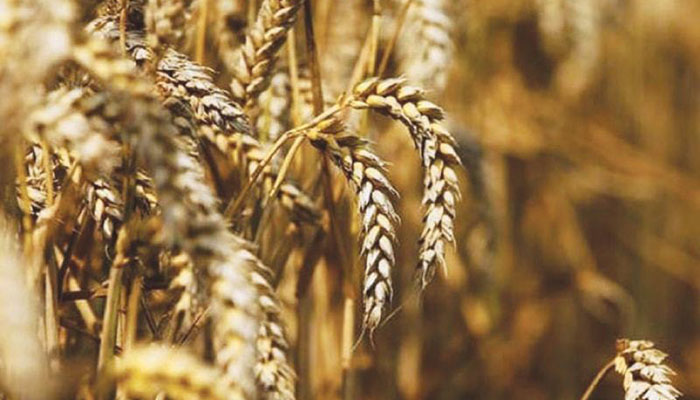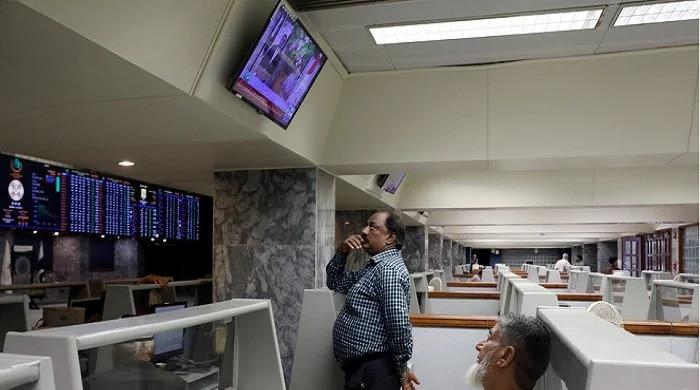ECC gives go-ahead to private sector for import of 2.5 million tons of wheat
ECC decides to not restrict wheat import by the private sector and to monitor the situation on monthly basis to ensure availability of wheat and flour
June 23, 2020

ISLAMABAD: The Economic Coordination Committee (ECC) on Monday gave a go-ahead to the private sector to import 2.5 million tons of wheat to control prices in the domestic market, reported The News.
The ECC took the decision during a meeting presided over by Adviser to the Prime Minister on Finance Hafeez Shaikh. The meeting also decided not to restrict the import of wheat to any limit by the private sector and to monitor the situation on monthly basis to ensure the availability of wheat and flour in all parts of the country at a reasonable price.
Various estimates suggest wheat production would be less than 25 million tons against an earlier envisaged target of 27 million tons due to bad weather conditions.
The Ministry of Food told the ECC that the total requirement of wheat stood at 26.5 to 27 million tons. “So far, 70 private sector parties showed interest to import wheat,” said one official after attending the ECC meeting. The market price of wheat per 40 kilograms per bag crossed Rs2,000 in different parts of Punjab. Flour price is expected to go up sharply in the months ahead in case of hoarding.
The ECC also approved the new lending policy to the provincial governments for their ways and means requirements and for the signing of agreements by the finance division and the State Bank of Pakistan to implement the new lending policy. Under the new policy, the existing ways and means limit for Punjab has been changed to Rs77 billion from Rs37 billion, to Rs39 billion from Rs15 billion for Sindh to Rs27 billion from Rs10.1 billion for Khyber Pakhtunkhwa and to Rs17 billion from Rs7.1 billion for Balochistan.
The ECC decided that provincial governments would be requested to announce their wheat release policy immediately, according to the Ministry of Finance. Punjab would release 900,000 tons of wheat to flour mills of the province during the next two months at a release price proposed by the provincial government to prevent a surge in the price of wheat/flour. The Government of Sindh would also be requested to announce its policy.
Pakistan Agricultural Storage and Services Corporation would assess the immediate requirement of Khyber Pakhtunkhwa and Balochistan and improve supply wheat as per agreed targets. Movement of wheat would be facilitated between Punjab and Khyber Pakhtunkhwa/Balochistan. Overall free movement of wheat should be ensured across the border and to ensure movement across districts and provinces.
Private wheat importers may be facilitated and arrangements between importers and Khyber Pakhtunkhwa/Balochistan should also be arranged and calculate the impact of subsidy for the import. The financial implications of import/non-imports by the private sector should also be assessed.
“If there is no import by private sector, then the government should import wheat itself,” the finance ministry said in a statement.
Monitoring and supply provisions would be improved to ensure the availability of wheat at shortage points and other market imperfections unconnected to supply and demand of wheat/flour should also be looked at, directed the ECC.
The cross-border movement of atta (flour) would be checked to ensure that it does not flow out to Afghanistan and points of exit.
The ECC further approved five proposals by the interior division for technical supplementary grants, including one technical supplementary grant (TSG) of Rs2.5 billion to clear accrued verified liabilities of Punjab mass-transit authority as federal share on account of the operation of Pakistan metro-bus system, two separate TSGs of Rs200 million and Rs36.4 million for Islamabad police to clear outstanding liabilities of Shuhada families; and two separate TSGs of Rs105.6 million and Rs60.5 million for Islamabad police to clear outstanding liabilities of the current fiscal year.
The ECC approved a package combining reduced duties and taxes for three months to ensure an uninterrupted supply of oxygen gas and oxygen cylinders in the country for medical purposes. The ECC also directed the ministry of national health services regulations and coordination and the ministry of interior to clear all outstanding dues payable to oxygen manufacturing companies as per legal provisions of contracts.
Originally published in The News











